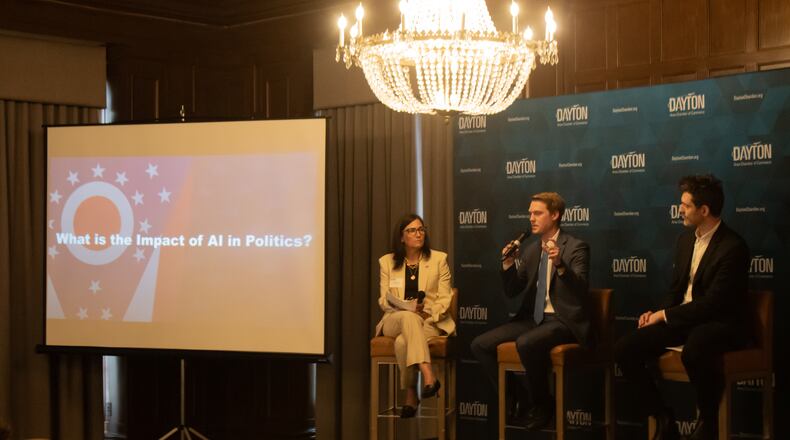1. Artificial intelligence gets closer to the mainstream
As artificial intelligence becomes more available, the tech is going to have “a massive impact on everything you do,” promised Michael Richards, a senior policy director focused on technology for the U.S. Chamber of Commerce.
While the concept or technology isn’t exactly new, advancements in computing power and speed will soon allow the tech “to really scale on the level in which we can really utilize it for a lot of basic things, a lot of the different sectors,” said Richards.
He — and much of the business sector — has an admittedly optimistic outlook on how AI is going to lead to medical innovations and discoveries or make work easier for employees, which would in turn make companies and governments more efficient, even when short staffed.
Richards pushed back against the fear that an AI boon might lead to more humans losing their jobs, or that it might take “humanity” out of some industries. Such an outcome has been predicted for years, he said, and it’s never come to fruition.
An outcome he does expect, along with Google’s Senior Policy Manager Joe Dooley, is that more and more political campaigns will begin leveraging AI.
The tech can be used to create or alter images, quickly analyze voter data on a granular level, and reduce time spent on repetitive tasks such as campaign mailers or press releases. As Dooley said, AI " lower(s) that bar for them to make sure that you, as voters and constituents, are getting what you need from them.”
“A campaign or government officials who do leverage artificial intelligence in their work, they are able to use it to come up with higher quality content in many cases that is more of interest, it speaks more to the people who they are asking for their vote and that they are responsible for serving in their official capacities,” Dooley said.
2. Government regulations on AI loom
Dooley, who represents Google’s interests in policy discussions in state legislatures throughout America, said he’s seen many states open discussions on regulating AI this year.
Here are the trends he’s seen in state government:
- The development of rules around disclosing when artificial intelligence is used in campaign communications or political advertisements;
- The creation of laws to punish individuals who use AI image software to depict minors in sexually explicit situations;
- The adoption of best practices in how government agencies or officials could use AI to better serve their constituents;
- The creation of exploratory commissions to get the full grasp of what regulatory steps need to be taken to minimize AI’s negative impact.
“There’s a lot of activity that is fairly consistent across states,” Dooley said, “And this is where, you know, Google is stepping in and trying to help them think through some of these topics as they advance those kinds of proposals.”
In Ohio, the House is in the process of considering a bill that would make it a new criminal offense to create and distribute “deepfake” pornography — a new trend that uses AI to depict a real person in a simulated sexual act. That bill has not yet moved.
Richards and Dooley both agreed that they’d like to see the federal government step in with its own standards on these topics to ensure a level of regulatory consistency across the country.
3. More tax deductions on the to-do list
The Ohio General Assembly is about to experience a shakeup, but its priorities won’t.
Senate Majority Whip Rob McColley, R-Napoleon, who is expected to take over as the Senate’s GOP leader after Senate President Matt Huffman’s term expires at the end of this year, assured Dayton business leaders that the Ohio Senate will continue looking to make the state as business-friendly as possible.
“If I were king of Ohio, which of course I’m not, but if I were king of Ohio and I had the ability to forecast what we were going to do in the next general assembly, I would say that we continue down the path of tax reductions in the state of Ohio,” McColley said, hinting at possibly making Ohio a flat income tax state and fully eliminating the commercial activity tax on businesses.
“This is the type of thinking that is going to make Ohio and even more competitive state with our peers,” McColley said.
For more stories like this, sign up for our Ohio Politics newsletter. It’s free, curated, and delivered straight to your inbox every Thursday evening.
Avery Kreemer can be reached at 614-981-1422, on X, via email, or you can drop him a comment/tip with the survey below.
About the Author

